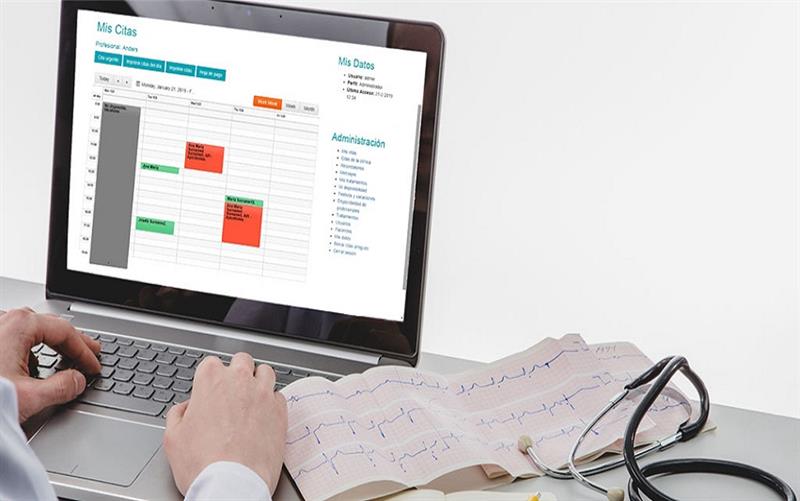
In an age when technology is altering every business, healthcare practices cannot afford to rely on antiquated systems and manual procedures. Practice Management Software is more than simply an administrative efficiency tool; it is an investment in your practice's future and your patients' well-being. PMS saves time and resources by streamlining operations, improving patient communication, and assuring compliance, allowing healthcare providers to focus on what is most important: providing great patient care.
Incorporating a modern PMS into your clinic keeps you competitive, compliant, and prepared to meet the changing demands of the healthcare sector. Practice management software is a vital component of every successful medical practice due to its numerous benefits, which range from greater patient satisfaction to increased revenue.
In today's rapidly changing healthcare scene, efficiency, precision, and patient-centered treatment are critical. Medical practices, whether tiny clinics or huge hospitals, confront several administrative issues that can be overwhelming without the proper tools. Enter Practice Management Software (PMS), a game-changing tool that simplifies operations, enhances patient care, and increases overall practice productivity.
Here’s why every medical practice should invest in practice management software:
1. Streamlined Administrative Tasks
One of the most difficult issues for medical clinics is managing an infinite administrative task. Scheduling appointments, keeping patient information, billing, and insurance verification are just a few of the tasks that take up significant time and resources.
PMS automates these procedures, freeing your team to concentrate on patient care rather than paperwork. With features such as automatic appointment reminders, insurance eligibility checks, and billing administration, PMS eliminates the chance of human mistake and saves time on tedious activities.
2. Improved Patient Scheduling and Flow
Managing patient appointments effectively may be a logistical nightmare, particularly in bigger offices. Double bookings, no-shows, and schedule issues can impede patient flow and frustrate both staff and patients.
Real-time scheduling tools in practice management software enable staff to swiftly book, reschedule, and confirm appointments. Advanced systems even allow patients to arrange appointments online, which reduces front-office workload and improves the patient experience.
3. Seamless Billing and Revenue Cycle Management
Billing is one of the most challenging components of establishing a medical practice. Managing claims, tracking payments, and ensuring that the practice receives proper compensation necessitates precise attention to detail. A single inaccuracy can result in late or refused payments, which can be costly for the practice.
PMS simplifies this process by automating claim filings, monitoring claim status, and giving real-time revenue cycle reports. Some systems also interface with electronic health records (EHR), ensuring that billing codes are correct and in accordance with current standards. This integration reduces errors, speeds up payments, and improves financial performance.
4. Enhanced Communication with Patients
Patients today have higher expectations of their healthcare providers than in the past. They expect quick information, easy access to their medical records, and clear communication. Patient engagement is facilitated by practice management software, which allows for two-way communication via secure messaging portals, email, or SMS reminders.
Many PMS solutions also have patient portals, where users may access medical data, check test results, and pay bills online. This level of transparency and convenience enhances patient happiness while also fostering trust and loyalty.
5. Efficient Compliance with Regulations
The healthcare business is heavily regulated, and keeping up with ever-changing legal and insurance requirements can be challenging. From HIPAA (Health Insurance Portability and Accountability Act) compliance to ICD-10 coding revisions, staying compliant is crucial to avoiding penalties and ensuring patient data security.
Most practice management systems have built-in compliance capabilities to help firms stay in line with industry norms. They provide audit trails, encryption, and secure access methods to protect sensitive data. By staying current on regulatory changes, PMS decreases the chance of infractions and assures seamless operations.
6. Data-Driven Decision Making
In today's healthcare context, data is an effective tool for improving clinical and financial outcomes. Practice management software enables you to create thorough reports on a variety of areas of your practice, including appointment numbers and income patterns. These insights can assist you in identifying inefficiencies, forecasting patient demand, and making educated decisions about staffing or resource allocation.
By evaluating performance measures like patient wait times, billing cycles, and treatment outcomes, practices may constantly improve their procedures, resulting in better patient care and increased operational efficiency.
7. Integration with Electronic Health Records (EHR)
Modern medical practices frequently rely on EHR systems to store and manage patient health information. Integrating practice management software with EHR systems enables the exchange of information between clinical and administrative operations. This integration keeps patient records up to date, enhancing communication between healthcare practitioners and lowering the risk of errors.
When both systems function together, practices benefit from increased efficiency and improved patient outcomes. For example, treatment plans, drugs, and test results from the EHR can directly influence billing procedures in the PMS, lowering the administrative burden and enhancing accuracy.
8. Scalability and Adaptability
As your medical practice expands, so will the complexities of maintaining it. Whether you're opening more locations, providing new services, or seeing more patients, practice management software can adapt to your needs. Many PMS solutions are cloud-based, which allows for simple upgrades, access from numerous locations, and adaptation to changing practice requirements.
This scalability assures that no matter how your practice evolves, your management system will be able to handle the increasing burden seamlessly.